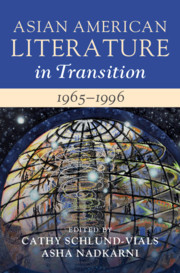Description
Asian American Literature in Transition, 1965-1996: Volume 3
Asian American Literature in Transition Series
Coordinators: Nadkarni Asha, Schlund-Vials Cathy J.
Language: English
Publication date: 06-2021
436 p. · 15.8x23.5 cm · Hardback
436 p. · 15.8x23.5 cm · Hardback
Description
/li>Contents
/li>Biography
/li>
Asian American Literature in Transition Volume Three: 1965?1996 offers a multidisciplinary perspective on the political and aesthetic stakes of what is now recognizable as an Asian American literary canon. It takes as its central focus the connections among literature, history, and migration, exploring how the formation of Asian American literary studies is necessarily inflected by demographic changes, student activism, the institutionalization of Asian American studies within the U.S. academy, U.S foreign policy (specifically the Cold War and conflicts in Southeast Asia), and the emergence of 'diaspora' and 'transnationalism' as important critical frames. Moving through sections that consider migration and identity, aesthetics and politics, canon formation, and transnationalism and diaspora, this volume tracks predominant themes within Asian American literature to interrogate an ever-evolving field. It features nineteen original essays by leading scholars, and is accessible to beginners in the field and more advanced researchers alike.
Part I. Immigration, Migration and Movement: 1. Scrutinizing Impossible Subjects Monica Chiu; 2. The Model Minority and Debt Erin Khuê Ninh; 3. Displaced Subjects and Refugee Literature Timothy August; 4. 1.5 Generation Literature as Asian Americanist Critique Marguerite Nguyen; Part II. Politics, Art and Activism: 5. Furious Dialectics: Diasporic Anger in the Poetry of Li-Young Lee James Kim; 6. Asian American Literature and the Vietnam War Catherine Fung; 7. Cross-Racial Solidarities and Asian American Literature Jeehyun Lim; 8. Re/Collecting Asian American Performance Christine Mok; 9. Multiculturalism and its Discontents Lynn Itagaki; Part III. Institutionalization and Canon Formation: 10. On Recovering Early Asian American Literature Floyd Cheung; 11. Asian American Poetics Warren Liu; 12. Maxine Hong Kingston's The Woman Warrior: A Milestone in Asian American Literature Lan Dong; 13. Making a Necessity of Extravagance: Work and Play in the Asian American (ist) Economy Chris A. Eng; 14. Marking the Difference made by 'Heterogeneity, Hybridity and Multiplicity': Lisa Lowe's Impact on Asian American Studies Melissa Phruksachart; Part IV. Diaspora and the Transnational Turn: 15. Rethinking Nationalistic Attachments through Narratives of Return, 1965–1995 Patricia Chu; 16. Diasporic Longings Bakirathi Mani; 17. Transnational Sexualities Patrick S. Lawrence; 18. Intimacy, Imperialism and America: Revisiting Post-47 Postcolonial and Asian American Writing Kavita Daiya; 19. Hemispheric Imaginings and Global Transitions: The Geopolitics of Asian American Literature in the Americas Crystal Parikh.
Asha Nadkarni is Associate Professor of English and the Director of American Studies at the University of Massachusetts Amherst. She also serves as co-chair of the Five College Asian/Pacific/American Studies Program. In addition to many articles and book chapters, she is author of Eugenic Feminism: Reproductive Nationalism in the United States and India (2014).
Cathy J. Schlund-Vials is Professor of English and Asian American Studies at the University of Texas (Austin). She served as President of the Association for Asian American Studies (2016–2018) and is the president-elect of the American Studies Association (2020). The author of numerous articles and book chapters, she has edited and co-edited a number of collections, including Keywords for Asian American Studies (2015) and Flashpoints for Asian American Studies (2017). She is author of Modeling Citizenship: Jewish and Asian American Writing (2011) and War, Genocide, and Justice: Cambodian American Memory Work (2012).
Cathy J. Schlund-Vials is Professor of English and Asian American Studies at the University of Texas (Austin). She served as President of the Association for Asian American Studies (2016–2018) and is the president-elect of the American Studies Association (2020). The author of numerous articles and book chapters, she has edited and co-edited a number of collections, including Keywords for Asian American Studies (2015) and Flashpoints for Asian American Studies (2017). She is author of Modeling Citizenship: Jewish and Asian American Writing (2011) and War, Genocide, and Justice: Cambodian American Memory Work (2012).
© 2024 LAVOISIER S.A.S.





